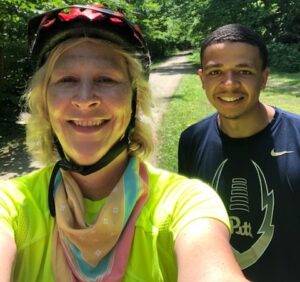
Several weeks ago, I embarked on a solo bike ride on one of my favorite bike trails – The Great Allegheny Passage in southwestern Pennsylvania. My plan was to bike 15 miles out and back, for a total ride of 30 miles.
I set off on a beautiful Sunday and chose the trail less taken – the Ohiopyle to Connellsville section. For most of the ride, the trail parallels the burbling Youghiogheny River, tucked underneath a canopy of full trees. Ten miles into my ride, I was in a reverie, admiring my surroundings, when I was startled by a solo rider who passed me without warning.
He was moving fast, but I was able to take in several features: He was young. He was quick. He had earbuds in. He was Black.
Any female who undertakes solo adventures in the wild knows exactly what I’m describing when I say I became hyper-aware. I wasn’t afraid, and I didn’t feel threatened in any way – but I did become keenly aware of my surroundings. I was alone in the woods on a lightly traveled path, a good ten miles from civilization.
The cyclist sped on and was soon out of view. But I found myself examining my own heart and asking myself if his Blackness had in any way influenced the pricking-up of my antennae. I don’t think it did – danger comes in all colors, and single women must stay alert. But I am also not naïve enough to assume that old messages don’t get revived under stress.
Imagine my surprise when I reached the 15-mile mark and found the young man sitting on a bench, eating fresh fruit.
We exchanged pleasantries – lovely day, great weather, nice ride.
And then I took a breath. I asked him: “How have you been doing since George Floyd?”
If my question surprised him, he didn’t show it. Instead, he began talking. When we finally got around to introducing ourselves, I learned that Curtis Duck was a banker, a graduate of the University of Pittsburgh who put himself through college and paid off all of his loans, and who often drove from Pittsburgh to Ohiopyle on weekends (a 75-minute drive) so that he could rent a bike and enjoy the beauty of the trail.
We talked without pause for the next two hours. Our conversation was becoming so rich that Curtis decided to turn back to Ohiopyle so that we could continue talking. Which we did, for the next 15 miles.
I made a new friend that day.
I’m sharing this story for several reasons.
First, to remind myself of a promise I made. I publicly declared my intent to be a better ally to my brothers and sisters of color. It’s easy to remember my goal when Black Lives Matter leads the news every day. It gets a little harder when the news cycle shifts, and we are back to COVID stories 24/7.
Second, to encourage others to start conversations with friends and colleagues of color. A comment I often hear from white friends is, “I want to say something, but I don’t know what to say.”
I get it. Starting a conversation about race and equity can feel awkward and uncomfortable. That’s why I’ve given myself permission to bumble and stumble. I’m learning, and I’m bound to make mistakes. Black friends and colleagues have been nothing but gracious in entering into conversations with me, opening their hearts, and course-correcting me in my journey. I am trying to do way more listening than talking. I remain humbly open to learning and hearing more.
A few days after our chance meeting on the bike trail, Curtis sent me a private message on Twitter. It was a retweet from Emmanuel Acho, the former football player and sports analyst, who has begun hosting the video series “Uncomfortable Conversations with a Black Man.”
The message read:
Dear white people,
For days you’ve asked me what you can do to help. I’ve finally found an answer. Let your guard down and listen.
Thank you, Curtis, for opening your heart to me and pedaling for two hours alongside a woman old enough to be your grandmother.
And to my friends on LinkedIn, don’t be afraid to start a conversation with someone who looks different from you. And then stop talking and listen. We have a lot to learn.
A beautiful missive, Anne. Thanks for the reminder to remain open to learning and listening, no matter what your age, ethnicity or color. Cheers, David